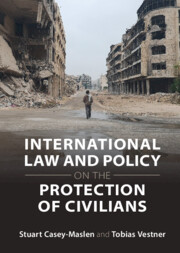Book contents
- Reviews
- International Law and Policy on the Protection of Civilians
- International Law and Policy on the Protection of Civilians
- Copyright page
- Contents
- Foreword
- Preface
- Introduction
- Part I The International Legal Framework
- Part II Specific Protection of Certain High-Risk Groups
- Part III State and Institutional Policies on the Protection of Civilians
- 15 The United Nations and the Protection of Civilians
- 16 NATO and the Protection of Civilians
- 17 The African Union and the Protection of Civilians
- 18 The European Union and the Protection of Civilians
- 19 The ICRC and the Protection of Civilians
- 20 Switzerland and the Protection of Civilians
- 21 The United Kingdom and the Protection of Civilians
- 22 The United States and the Protection of Civilians
- 23 Brazil and the Protection of Civilians
- 24 India and the Protection of Civilians
- 25 Norway and the Protection of Civilians
- 26 South Africa and the Protection of Civilians
- 27 The Future of Protecting Civilians
- Conclusion
- Book part
- Index
Conclusion
from Part III - State and Institutional Policies on the Protection of Civilians
Published online by Cambridge University Press: 11 August 2022
- Reviews
- International Law and Policy on the Protection of Civilians
- International Law and Policy on the Protection of Civilians
- Copyright page
- Contents
- Foreword
- Preface
- Introduction
- Part I The International Legal Framework
- Part II Specific Protection of Certain High-Risk Groups
- Part III State and Institutional Policies on the Protection of Civilians
- 15 The United Nations and the Protection of Civilians
- 16 NATO and the Protection of Civilians
- 17 The African Union and the Protection of Civilians
- 18 The European Union and the Protection of Civilians
- 19 The ICRC and the Protection of Civilians
- 20 Switzerland and the Protection of Civilians
- 21 The United Kingdom and the Protection of Civilians
- 22 The United States and the Protection of Civilians
- 23 Brazil and the Protection of Civilians
- 24 India and the Protection of Civilians
- 25 Norway and the Protection of Civilians
- 26 South Africa and the Protection of Civilians
- 27 The Future of Protecting Civilians
- Conclusion
- Book part
- Index
Summary
To conclude, the protection of civilians has become a well-established concept consisting of international law, policies, and practices. The legal framework, notably the content and form of international humanitarian law (IHL), human rights law, disarmament law, and refugee law, offers protection to civilians, particularly in situations of armed conflict. At the level of jus ad bellum and the primary role of the United Nations (UN) Security Council, the last two decades have witnessed a higher priority being accorded to the protection of civilians. That violations of IHL and especially attacks against civilians or indiscriminate attacks constitute a threat to international peace and security, as that term is understood in Chapter VII of the UN Charter, is a major normative shift.
- Type
- Chapter
- Information
- International Law and Policy on the Protection of Civilians , pp. 282 - 283Publisher: Cambridge University PressPrint publication year: 2022

